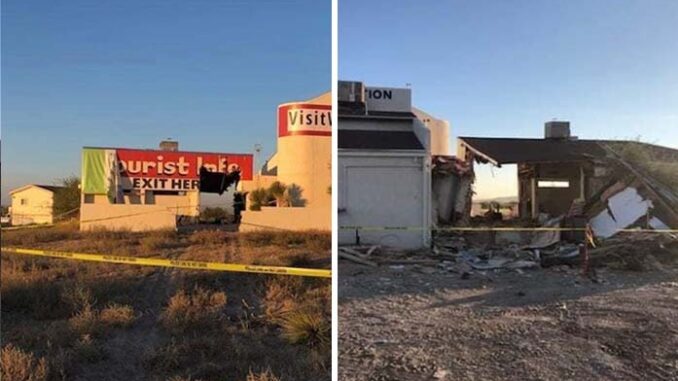
Shortly after a Pennsylvania truck driver lost control of a tractor-trailer on Interstate 10 and crashed through the Willcox Welcome Center in 2020, the city received more than $240,000 from its insurance provider. That provider -the Arizona Municipal Risk Retention Pool- has been fighting trucking company Takata Trans Inc. ever since then to be reimbursed for the city’s claim.
A lawsuit filed in Cochise County in 2021 by the risk pool accuses the company of negligence for allowing Horia F. Tomescu to be driving its truck given his history of heart problems. Tomescu, 50, died at the scene.
Now, the municipal risk pool wants to amend the lawsuit so jurors will be allowed to consider awarding punitive damages based on the trucking company’s alleged disregard of the risk Tomescu posed to the public prior to the crash.
Punitive damages can be awarded by a jury to punish a party for their actions separate of compensation for actual costs. It is also intended to curb future reprehensible behavior. But proving a punitive damages claim has a high threshold, according to a 2022 Arizona Supreme Court ruling.
It is not enough that a defendant like Pennsylvania-based Takata Trans had reason to appreciate the severity of a risk, the ruling clarified. The defendant must have actually appreciated the severity of the risk before consciously disregarding it.
The justices even noted “it will be only the rare negligence case that meets this standard.” The attorneys for the risk pool belief this is one of those rare cases.
Public records show the Takata-owned truck hauling refrigerated Kellogg’s food products veered off westbound I-10 at 75 mph near milepost 342 around 8:23 p.m. on Oct. 19, 2020. At the time, it was a dark but otherwise clear night with a dry, straight roadway, according to the Arizona Department of Public Safety (DPS) accident report.
The truck easily took out a ranch wire fence before traveling across a field and plowing through a cement retaining wall. It then went completely through the Willcox Welcome Center, which had recently undergone a makeover.
The truck finally came to a rest in the parking lot of the nearby DPS – Willcox station. Two DPS troopers working inside the station at the time reported their building “shook violently” and they heard the sound of screeching metal.
When the dust and debris cleared, the troopers could see a severely damaged jackknifed semi had come to rest a mere 10 feet from their patrol vehicles.
At the wheel was Tomescu, a Romanian national. He is presumed to have suffered a medical episode which incapacitated him at the wheel, as witnesses reported never seeing brake lights.
Whether Tomescu died before, during, or shortly after the crash could not be determined, but an autopsy performed by the Pima County Medical Examiner ascribed Tomescu’s death to atherosclerotic heart disease and determined the manner of death was natural.
Takata Trans owner Radoslav Alendarov’s defense against the accident bill relies in part on the autopsy findings to argue that Tomescu’s “unforeseen” medical emergency negates the company’s liability for the accident.
However, the autopsy report also revealed Tomescu had stents in his coronary arteries. There was also evidence of prior myocardial infarctions, both acute and chronic.
A myocardial infarction is the medical term for what is more commonly known as a heart attack.
It was later learned that Tomescu obtained a medical examination certification attesting to his fitness to operate as a long haul driver just five days before the crash. The medical clearance card presented to and accepted by Takata’s safety director was signed by a Pennsylvania chiropractor.
It is still unclear whether Tomescu revealed his heart problems to the chiropractor. However, Takata’s safety director later admitted knowing of Tomescu’s prior heart issues.
That information and other recently discovered facts prompted the risk pool’s attorneys to ask Judge Terry Bannon last month for permission to amend the lawsuit to seek punitive damages.
“The basis for the request is that the Federal Motor Carrier Safety Act (FMCSA) guidelines have specific procedures and obligations posed on carriers like Takata Trans for drivers with prior heart health problems and history,” the motion states. “Takata Trans’ position in this litigation is that the chiropractor’s evaluation of Tomescu was sufficient.”
Bannon will conduct oral arguments this spring on the motion, which is opposed by Takata Trans. The trucking company argues nothing put forth in the case by the risk pool warrants consideration of punitive damages.
“No evidence presented demonstrates actual knowledge, at the time of the alleged negligent act or omission, of a substantial risk of significant harm and a conscious disregard of those risks,” Takata attorneys argue in a written response to Bannon.
Takata further argues the accident occurred due to Tomescu’s “sudden and unexpected heart attack,” and that its own expert witness on trucking industry standards of care found Tomescu was qualified to operate a commercial motor vehicle and was medically cleared to do so.
Attorneys for Takata also contend there is no evidence the company had malice, spite or ill will toward the City of Wilcox. And that the municipal risk pool cannot show the trucking company “actually appreciated the severity of the risk” let alone consciously disregarded the risk.
A jury trial will likely occur sometime in early 2024 if the case is not settled first.
